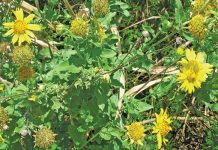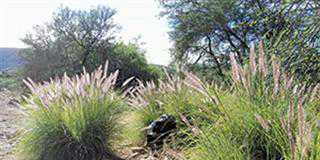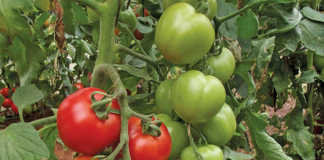Humus is organic matter in soil that has broken down as far as it can and is now stable. It is black and jelly-like, and coats soil particles, ‘glueing’ them together to form crumbs, or aggregates.
Figure 1 shows soil without humus. This soil lacks structure and has few spaces to hold air, water and nutrients.

In Figure 2, humus has coated the soil particles and created small clumps of soil.

Figure 3 shows how water and air can now be held within this structure.
Fertility
Humus determines how fertile the soil is. Soil with humus:
- Holds nutrients and prevents them from leaching.
- Acts like a sponge, absorbing moisture. This helps the soil during dry spells.
- Traps oxygen, which is essential for root development.
- Feeds and protects microbes in the soil.
- Prevents erosion by holding soil particles together.
- Helps root structures to grow by contributing to improved vigour.
- Protects the soil from extremes in temperature.
- Maintains soil pH, helping to correct soil pH problems.
The difference that humus can make
Humus can significantly change the properties of soil. A clay soil with a high humus content, for example, is made up of large, water-stable aggregates and can absorb and hold more water than sandy soil with no humus. However, if the humus content is low, this same clay soil can be very dense and virtually impenetrable to rainwater. When dry, it is almost impossible to work.
On the other hand, sandy soil with a high humus content is able to hold water and nutrients and is not prone to leaching.
Unfortunately, the continual application of soluble inorganic fertilisers, combined with annual ploughing and the burning of crop residues, can deplete the humus content of sandy soils within five years and that of clay soils within 10 years.
Foundations for Farming (FFF) is a Zimbabwe-based NGO that teaches conservation agriculture practices to farmers, based on Christian principles. FFF provided the information for this article. Visit www.foundationsforfarming.org.













